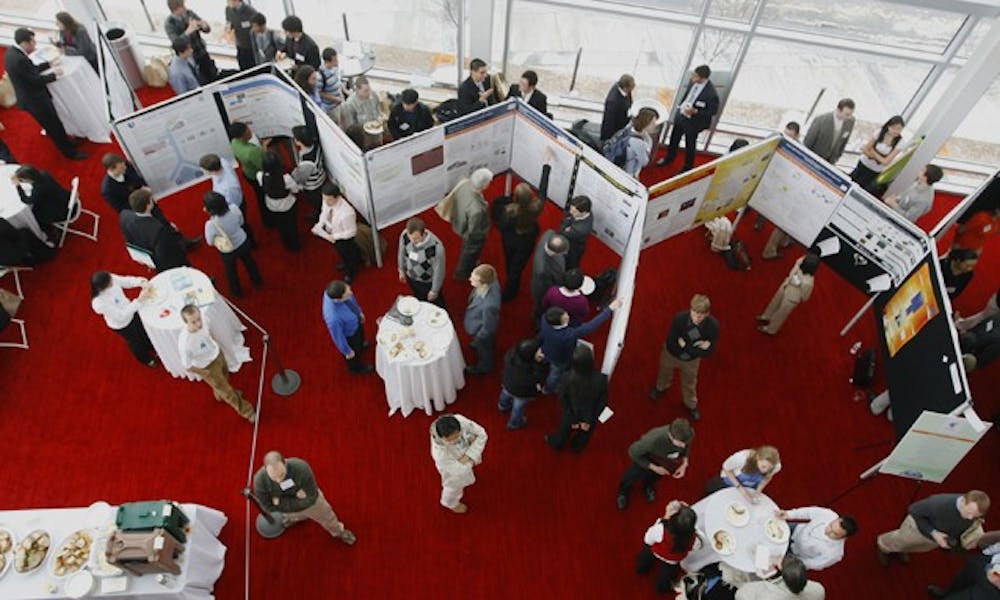Engineering students now have an opportunity to graduate with distinction for addressing one of the 14 grand challenges identified by the National Academy of Engineering.
The Grand Challenge Scholars program, a new initiative by the Pratt School of Engineering, is designed to expand the engineering curriculum to include social, ethical and environmental awareness of major engineering problems in the world, according to the program’s Web site.
“This program is a tremendous opportunity for Pratt to show national leadership in the engineering field by taking one of the strengths of the Pratt school—its interdisciplinary curriculum—and tie it to one of the major opportunities for engineering, which is addressing the grand challenges,” Pratt Dean Tom Katsouleas said.
Earlier last year, the NAE identified 14 societal problems that could be alleviated with the help of engineers to improve living standards. In response, Duke, the University of Southern California and Franklin W. Olin College of Engineering near Boston, Mass. hosted the Grand Challenges Summit, which took place at the Durham Performing Arts Center in March. The conference included lectures and student seminars related to the NAE grand challenges, which led to the development of a program directly affiliated with Pratt.
The program is looking for engineering students who are interested in addressing one of the NAE challenges, which include reverse engineering the brain, preventing nuclear terrorism and designing affordable methods to capture solar energy.
Each GC scholar must propose a five-component portfolio their junior year and complete a GC senior thesis in order to receive this distinction on their Duke transcript. The program will accept approximately five to 10 seniors and about 25 juniors to jumpstart the program in its first year, said Will Patrick, a senior who served as the student representative on Duke’s GC Scholars program committee. Every subsequent year, only juniors will be permitted to apply.
“We need to get smart people to help us solve these problems, and Duke is a likely place to find talented students,” said Program Director William Reichert, a professor of biomedical engineering and chair of the National Grand Challenges Scholars steering committee. “Hopefully, if they get involved working on these grand challenges now, they will continue to work on them in their post-graduate, and if they go off to become doctors or business people, they will remain aware of these issues.”
Duke and USC are currently the only two universities with active GC Scholar programs. A program at Arizona State University was recently approved, and approximately 15 other institutions are working on developing this program. The National Grand Challenges Scholars committee is currently working to build a network of about 50 GC programs across the nation, Reichert said.
Patrick said he was one of the first students to approach Katsouleas about integrating other fields of study into the engineering curriculum.
“This will give students additional ways to look at problems, rather than just the technical framework we are taught as engineers,” Patrick said. “This program is a great way for the engineering school to be more interdisciplinary with other schools because the grand challenges aren’t just problems for engineers—they relate to the other departments at Duke.”
The purpose of the project was to generate discussion about engineering, said Randy Atkins, director of the Grand Challenges project and senior public relations officer for the NAE.
“The grand challenges show you that you can change the world through engineering,” Atkins said.
Patrick explained that the GC Scholars program is designed so that students who are already involved in programs such as Engineers Without Borders and the Smart Home Fellows can use these contributions to fulfill the GC requirements.
To raise awareness of the Grand Challenges, Pratt will host various events and programs for students, Reichert said.
In addition, the challenges have already made their way into the engineering curriculum. Freshman Frank Chang said he researched the challenges for a class.
“[I] saw that some of them are very basic things like providing clean water to everybody,” Chang said. “This is definitely something everyone should have access to.”
Reichert said administrators have been supportive of the program and added that the next step will be for the GC Scholars Program to reach out to the larger University community.
Get The Chronicle straight to your inbox
Signup for our weekly newsletter. Cancel at any time.

